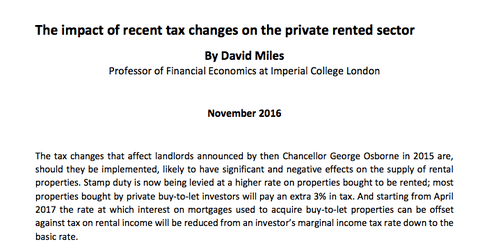Landlords trapped in to paying more tax by finance interest relief changes coming into force in April need to raise rents by up to 30% to offset the extra cash they hand to HM Revenue and Customs (HMRC), according to an independent expert.
David Miles, Professor of Financial Economics at Imperial College London, argues the tax changes will impact on the availability of buy to let properties in a paper analysing the effects of the impending tax increase.
His paper The Impact Of Recent Tax Changes On The Private Rented Sector picks apart how the new tax is calculated and offers a number of scenarios for landlords.
But the overriding thrust of the report is that he can see no reason to bring in the tax changes and recommends the government should abandon the move.
“In a world where house prices might be consistently higher relative to incomes than in the past we might naturally expect the period in which people are in the rented sector is longer,” said Miles.
“There are good economic reasons for believing that in a country with a rising population and where real incomes tend to increase over time that house prices might well rise at least as fast as incomes. To then introduce measures that reduce the supply of rented property is perverse.
“Can the tax changes be defended because it is not appropriate for the private rented sector to be significantly supplied by small scale landlords? It is not at all clear that it can.
“There is no evidence that private landlords with a small number of properties are bad landlords. Nor is there any reason to think that investing in property to rent is an inappropriate thing for people to do with part of their saving.”
Miles was also a member of the Bank of England rate-setting Monetary Policy Committee for six years to September 2015.




